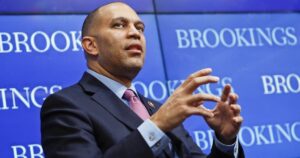Delegate's Protest Highlights Voting Rights Issue
U.S. Virgin Islands Delegate Stacey Plaskett sparked debate on Friday during a session on the House floor by addressing the nonvoting status of delegates from U.S. territories.
Plaskett's protest drew mixed reactions as she highlighted the exclusion of U.S. territory delegates from voting in the House speaker election, prompting a division between applauding Democrats and booing Republicans, according to Fox News.
Stacey Plaskett serves as the delegate representing the U.S. Virgin Islands. Her role, like those of other delegates from U.S. territories, does not allow her voting right in the election of the House speaker—a point she protested elaborately. Expanding on the unique plight of these territories, she underscored the significance of the approximately four million Americans and the substantial number of veterans living in these regions.
Questioning The Voting Exclusion
Addressing her colleagues, Plaskett questioned the rationale behind the exclusion of delegates from territories such as the Virgin Islands, Puerto Rico, the Northern Mariana Islands, and the District of Columbia from these pivotal votes. Highlighting their shared status of being unable to vote, she prompted the House clerk to clarify the legislative grounds for this exclusion.
The House clerk responded by citing Section 36 of the House Rules and Manual. This rule prescribes that only representatives-elect qualify to cast a vote in the speaker election. This explanation, however, did little to appease Plaskett's concerns about the fairness of the process.
A Tension-Filled Response
The protest initiated by Plaskett brought about a mixed response in the House. Supportive applause came from Democratic members, while Republican members expressed their disagreement with boos. Despite the divided reactions, the real issue lay deeper than the immediate outcry—the long-standing nonvoting status of delegates from territories.
Plaskett went on to criticize what she described as the nation's "colonies problem." In her view, the situation, which was intended to be temporary, has unfairly persisted over time, entrenching disenfranchisement for millions.
Plaskett's Call For Action
As Plaskett continued her remarks, her microphone was abruptly cut off, muffling her ongoing argument and efforts to raise awareness about this issue. Despite the interruption, Plaskett managed to convey the urgency of addressing this longstanding concern by emphasizing that a solution is overdue for this "permanent" issue.
Having been a nonvoting delegate since 2015, Plaskett has witnessed the election of seven House speakers during her tenure, all while lacking the ability to vote in these critical decisions.
A Long-Standing Legislative Problem
Throughout her time in Congress, Plaskett has highlighted the inequity faced by residents from the U.S. territories. The legislative restrictions prevent these communities from having a say in selecting the leadership that affects their lives directly. This is a system she considers unfair and one that demands reform.
Plaskett’s passionate remarks serve as a reminder of the broader conversation about the representation of U.S. territories in federal government decisions. Her protest underscores the need for legislative change to grant these territories a voice on par with the states.
The Broader Implications Of The Protest
This recent session in the House brought to light an issue that has been simmering for decades. For delegates like Plaskett, who advocated for equality in Congress, the protest was not merely symbolic but a call to action echoed by many who champion voting rights and full representation.
The debate surrounding this issue is complex, involving historical, political, and constitutional elements. However, at its core, it challenges the principles of representation and equality that underpin American democracy.
Arguments For And Against Change
Advocates, like Plaskett, argue that the right to vote and fully participate in legislative processes is fundamental for all U.S. citizens, regardless of geographic location. Meanwhile, opponents of changing current rules often cite constitutional limits and logistical challenges.
Nonetheless, the nonvoting status of these territories remains an unresolved predicament. It affects not only the delegates themselves but also the millions of constituents they represent.
Moving Forward And Seeking Solutions
As the nation continues to grapple with questions of equity and representation, moments like Plaskett's protest are crucial. They bring awareness and prompt discussions that might eventually lead to policy changes.
Ultimately, whether or not legislative reforms come about will depend on the willingness of the U.S. Congress to tackle this complex issue and engage in a meaningful dialogue about the rights of U.S. territories.
Stacey Plaskett's intervention in the House speaks volumes about the enduring struggles for equal representation and the ongoing debate on how best to honor the democratic principles that the United States is built upon.




